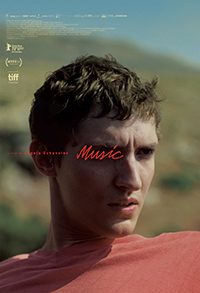Oedipus Shrugged: Schanelec Finds Tragedy is the Song That Doesn’t End
 There’s little use clinging to the description of Angela Schanelec’s latest film Music as being ‘freely adapted from the myth of Oedipus’ as the only players truly blinded are the audience members themselves in this elliptical, overtly self-indulgent post-narrative endeavor. For those who’ve experienced and enjoyed Schanelec’s last nine features, the structure of her latest should come as no surprise, effused with long shots filled with seemingly banal details and repetitive visual cues which sometimes seem to coalesce into an actual subtext and then drift away into some other strand of focal points. The titular music doesn’t provide us with an easy roadmap either (and a burst of baroque examples don’t arrive until the hour mark), even if, painstakingly pieced together, they likely provide some specific contexts.
There’s little use clinging to the description of Angela Schanelec’s latest film Music as being ‘freely adapted from the myth of Oedipus’ as the only players truly blinded are the audience members themselves in this elliptical, overtly self-indulgent post-narrative endeavor. For those who’ve experienced and enjoyed Schanelec’s last nine features, the structure of her latest should come as no surprise, effused with long shots filled with seemingly banal details and repetitive visual cues which sometimes seem to coalesce into an actual subtext and then drift away into some other strand of focal points. The titular music doesn’t provide us with an easy roadmap either (and a burst of baroque examples don’t arrive until the hour mark), even if, painstakingly pieced together, they likely provide some specific contexts.
A film inherently more interesting to discuss than it is to consume, especially considering her cast was arguably invited to abstain from conveying realistic emotions, its pleasures lie in the challenge of puzzling together these details and symbols, inherently requiring more than one viewing to whittle away at its mysteries.
In a mountainous Greek village circa the 1980s, it appears a woman may have been murdered during a storm, potentially by her partner. A child is rescued from a hut by a paramedic named Elias (Argyris Xafis), who takes the child home to his wife. They name him Jon. Time passes, and Jon (Aliocha Schneider) is on a joyride to the beach with a handful of friends, his feet chafed by his sandals, bearing red marks which also appeared in the same bodily vicinity when he was an infant. He’s approached by a young man named Lucien, who attempts to kiss him, an action which results in his death when Jon pushes him away, his head bashed on a rock. Serving one year of incarceration, he’s introduced to one of the seemingly all-female guard staff, Iro (Agathe Bonitzer), who introduces him to baroque composers, listening to a selection of classical pieces on tape. Years pass, and Jon, who now wears similar glasses to those worn by the dead Lucien, is married to Iro, and they have children together. During a visit to his parents, Iro is suddenly compelled to call Lucien’s parents, a boy she maybe was involved with in some capacity, confirming he was killed seven years prior by Jon. This confirmation leads to her suicide. More time passes, and Jon, now part of a contemporary music group, lives in Berlin. When a notable businessman is killed in a car accident on Potsdamer Platz, the news shocks those in Jon’s entourage, one of whom is a young woman who collects a leather satchel the dead man was carrying upon his death. Jon takes this satchel to the police station, and after waiting several minutes, apparently is struck blind, then saved from a car accident himself by this new woman.
Four bodies, abrupt shifts from Greece to Berlin in a period spanning from the 1980s to 2006 (based upon a 2006 football game which Jon is watching at his parents’ house, a detail more readily gleaned from the film’s press statement than the film) assist in making a slow, languid film feel strangely head spinning by its verdurous finale with characters from the Berlin segment frolicking playfully in the woods. Although this presents an intriguing, challenging exercise in how Schanelec has abstractly transposed the myth of Oedipus onto a perilously austere contemporary tale about a cursed orphan who is reinvented and revitalized by music, a sympathetic character or moment would have at least been a polite attempt to engage the audience. The only two figures who arguably craft a performance are Agathe Bonitzer (daughter of Pascal Bonitzer and Sophie Fillieres) and Aliocha Schneider (brother of Niels Schneider), but neither of them come close to being compelling figures in this shelled mythos.
Schanelec’s excellent last feature, I Was At Home…But (2019) feels manically loquacious in comparison since the script of Music is limited to mere impressions, as we’re only fed any kind of directional dialogue during Iro’s conveniently timed, fateful phone call. If anything, it tends to point to a sort of universal atonement. If Jon seems cursed by fate, each stroke of tragedy leads to some kind of salvation, eventually allowing him to blossom into a blind but talented troubadour. But really, a more appropriate title would be I Was in Greece…But.
Reviewed on February 21st at the 2023 Berlin International Film Festival – Competition. 108 mins.
★★★/☆☆☆☆☆


